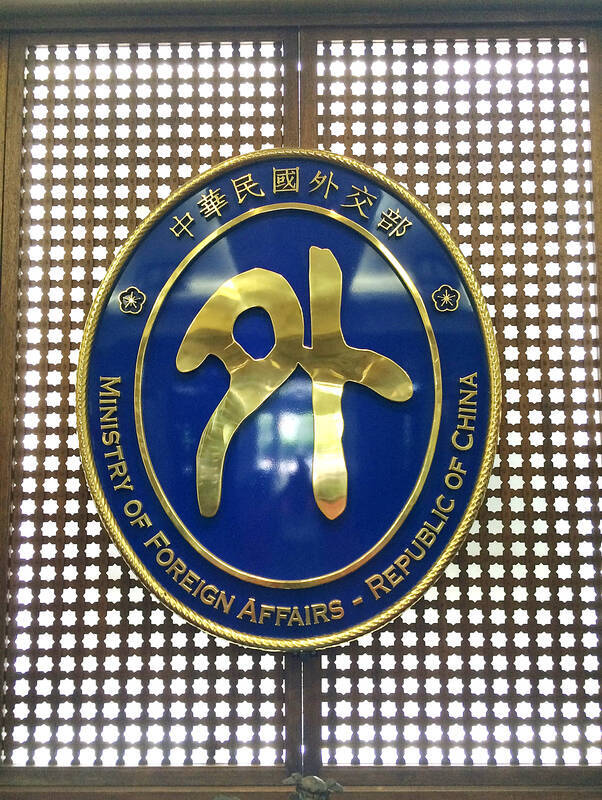The Ministry of Foreign Affairs (MOFA) yesterday condemned Chinese Minister of Foreign Affairs Wang Yi (王毅) for saying that UN Resolution 2758 “resolved the issue of the representation of the whole of China, including Taiwan, in the UN.”
The ministry said in a statement yesterday that neither the Republic of China (ROC) nor the People’s Republic of China (PRC) is subordinate to each other, which is the objective status quo in the Taiwan Strait and a fact acknowledged by the international community.
The statement came as a response to Wang’s speech at the General Debate of the 79th session of the UN General Assembly in New York on Saturday saying that Taiwan is “an inalienable part of China’s territory” and that it is both “the history and the reality.”

Photo: Lu Yi-hsuan, Taipei Times
The 26th session of the UN General Assembly adopted Resolution 2758 with an overwhelming majority, he said.
Passed 76 to 35, with 17 abstentions, on Oct. 25, 1971, the text of Resolution 2758 recognizes “the representatives of the People’s Republic of China as the only legitimate representatives of China to the United Nations” and expels “the representatives of Chiang Kai-shek” (蔣介石).
Wang said the resolution restored all the rights of the PRC at the UN, recognized the representatives of the PRC government as the only legitimate representatives of China to the UN, and expelled forthwith the representatives of the Taiwan region from the UN and all the organizations related to it.
“Once and for all, the resolution resolved the issue of the representation of the whole of China, including Taiwan, in the UN,” he said.
The resolution made clear that there is no such thing as “two Chinas,” or “one China, one Taiwan,” he said, adding that “there is no gray zone or room for ambiguity” on this matter.
In Taipei, the ministry yesterday said UN Resolution 2758 does not mention Taiwan and neither stated that Taiwan is part of the PRC, nor authorized the PRC to prevent Taiwan from joining the UN system, so it did not resolve the issue of Taiwan’s representation in the UN.
“Only the government elected by the people of Taiwan can represent Taiwan in the UN and international organizations,” it said.
While calling on China to stop misleading the international community, the ministry also urged the international community to recognize China’s malicious intent of distorting UN Resolution 2758 to unilaterally change the “status quo” in the Taiwan Strait and fabricate a legal basis for invading Taiwan.

MISINFORMATION: The generated content tends to adopt China’s official stance, such as ‘Taiwan is currently governed by the Chinese central government,’ the NSB said Five China-developed artificial intelligence (AI) language models exhibit cybersecurity risks and content biases, an inspection conducted by the National Security Bureau (NSB) showed. The five AI tools are: DeepSeek, Doubao (豆包), Yiyan (文心一言), Tongyi (通義千問) and Yuanbao (騰訊元寶), the bureau said, advising people to remain vigilant to protect personal data privacy and corporate business secrets. The NSB said it, in accordance with the National Intelligence Services Act (國家情報工作法), has reviewed international cybersecurity reports and intelligence, and coordinated with the Ministry of Justice Investigation Bureau and the National Police Agency’s Criminal Investigation Bureau to conduct an inspection of China-made AI language

LIMITS: While China increases military pressure on Taiwan and expands its use of cognitive warfare, it is unwilling to target tech supply chains, the report said US and Taiwan military officials have warned that the Chinese People’s Liberation Army (PLA) could implement a blockade within “a matter of hours” and need only “minimal conversion time” prior to an attack on Taiwan, a report released on Tuesday by the US Senate’s China Economic and Security Review Commission said. “While there is no indication that China is planning an imminent attack, the United States and its allies and partners can no longer assume that a Taiwan contingency is a distant possibility for which they would have ample time to prepare,” it said. The commission made the comments in its annual

CHECKING BOUNDARIES: China wants to disrupt solidarity among democracies and test their red lines, but it is instead pushing nations to become more united, an expert said The US Department of State on Friday expressed deep concern over a Chinese public security agency’s investigation into Legislator Puma Shen (沈伯洋) for “secession.” “China’s actions threaten free speech and erode norms that have underpinned the cross-strait ‘status quo’ for decades,” a US Department of State spokesperson said. The Chongqing Municipal Public Security Bureau late last month listed Shen as “wanted” and launched an investigation into alleged “secession-related” criminal activities, including his founding of the Kuma Academy, a civil defense organization that prepares people for an invasion by China. The spokesperson said that the US was “deeply concerned” about the bureau investigating Shen

‘TROUBLEMAKER’: Most countries believe that it is China — rather than Taiwan — that is undermining regional peace and stability with its coercive tactics, the president said China should restrain itself and refrain from being a troublemaker that sabotages peace and stability in the Indo-Pacific region, President William Lai (賴清德) said yesterday. Lai made the remarks after China Coast Guard vessels sailed into disputed waters off the Senkaku Islands — known as the Diaoyutai Islands (釣魚台) in Taiwan — following a remark Japanese Prime Minister Sanae Takaichi made regarding Taiwan. Takaichi during a parliamentary session on Nov. 7 said that a “Taiwan contingency” involving a Chinese naval blockade could qualify as a “survival-threatening situation” for Japan, and trigger Tokyo’s deployment of its military for defense. Asked about the escalating tensions